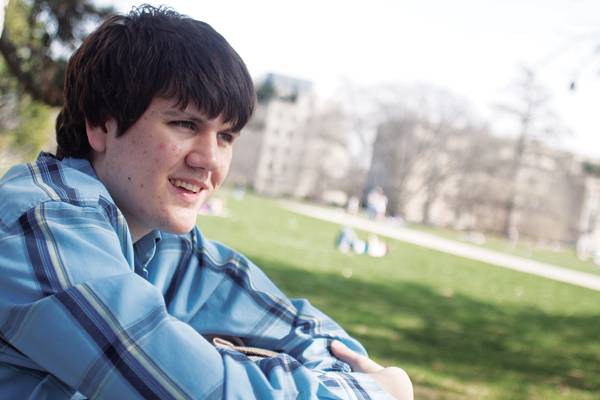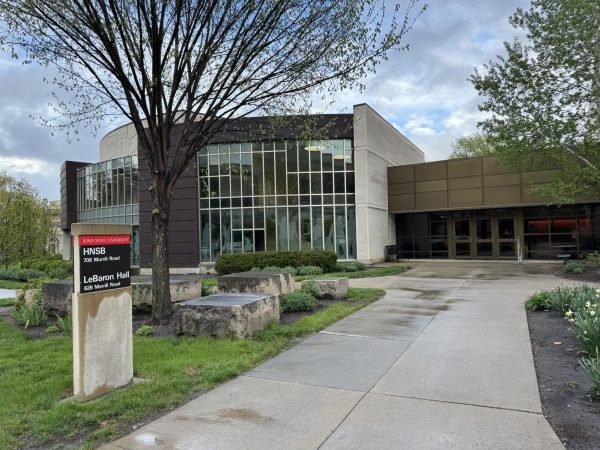The flavor of contentment

Dylan Voyda has Asperger’s syndrome, a condition that causes him to look for the good in people, as well as obsess over one specific thing. For Dylan, that obsession is cooking, and he one day hopes to be an executive chef. Photo: Karuna Ang/Iowa State Daily
April 8, 2010
“A symptom of my condition is that I love to cook,” Dylan said.
Dylan’s condition is Asperger’s syndrome, a high-functioning form of autism.
“When you’re a child with autism, you’ll obsess over something. Mine was my mother would let me make a salad, and I would see what worked out of the spice cabinet.”
“Let’s make your favorite thing,” Dylan Voyda’s mother, Karen, would say to her two sons when they were young.
Dylan would make spaghetti sauce from scratch and crepes. His favorite recipe to make is still his specialty, manicotti, a dish of oversized-pasta shaped like tubes with cheese in them.
“It was like a cooking camp but in our house … just for us,” Karen Voyda said.
As a child, Dylan’s mother said he always enjoyed sitting in front of the TV and watching the cooking shows.
With their cooking camp, Karen believes it helped him discover what his purpose was and gave him a focus without which he might never have gone to Iowa State.
Dylan holds a job at Union Drive Community Center where he works during the breakfast hours. He aspires to be an executive chef one day or at least to be involved with cooking, the development of recipes or sauces.
“Sometimes I’d ruin the salad and sometimes it’d taste good,” Dylan said. “I really didn’t think about what I was doing, but I loved to do it. It’s just, how does anyone really gets taught anything — trial and error — and part of it is just me being me.”
After living with his condition for the course of his life, Dylan couldn’t picture his life without it.
While rubbing his nose, he mentions how much it’s a part of him. He feels like it’s this incredible curse that has kept him from making friends and being normal and doing everything he wants to do in his life; but at the same time, Asperger’s has been his greatest gift. It’s given him a perspective on humanity as an attentive listener.
His condition has made him learn all he could about things and to find the good in people. He’s also seen the repercussions of the disorder; people aren’t always honest with him or they use sarcasm too much — he advises no one to use sarcasm in a conversation with someone who has autism.
Sometimes Dylan shouts without thinking he’s shouting or when he’s talking about something that excites him. During the process of him explaining his point, Dylan gets progressively louder to demonstrate his example.
He once had a situation where he kept getting louder, and although people told him he was shouting, he thought he was whispering to himself when really he was yelling at the top of his lungs — screaming himself hoarse.
Before he speaks again, Dylan becomes fixated on the puzzle on the table in front of him. Each puzzle piece is carefully placed together wherever Dylan can fit it.
Although he has a long way to go before he finishes it, the puzzle is starting to come together from when he started at the beginning of the interview. As he figures out where each piece fits within each part of the picture, the puzzle is getting closer to getting put back together again.
Dylan adjusts his blazer and describes his favorite one to me: a “perfect teacher-professor blazer.”
“I once had a teacher in high school who probably should’ve taught college courses … Mr. Eby … he was my history teacher,” Dylan said. “He had a big influence in my life. He made me realize that if you learned history and you learned what has been good and bad on your side — not only will you be a smarter person for it, but you will understand what you’re fighting for.”
Dylan adjusts the blazer he’s wearing again, running his hands along the sides of it while putting his pocket watch back in his hand.
His roommate doesn’t really know he has autism, or so Dylan believes. He doesn’t think it’s important to tell him about it. He makes concessions for people. He tries to be “as good as he can.” The more he knows a person, the less autistic Dylan says he is.
“I can be almost normal if I know a person,” Dylan said. “My roommate might know. I don’t care if he does or not. In fact, I don’t think Jake really knows. I hope he’s coming. He knows I hate it when people are late; it really disappoints me.”
Jake Shyer, freshman in mechanical engineering, is Dylan’s best friend. They met in fourth grade and became friends in fifth grade.
Jake is right on time. He walks into the den wearing a brown, Indiana Jones-inspired hat and glasses with transitional lenses that have a slight tint to them.
“I feel like I’m better when I’m close to him. Maybe when he stumbles I can help. And it’s not embarrassing; I just want to help my friend out. When we go somewhere, I let him do whatever and be who he wants because that’s what I’m doing,” Shyer said.
Dylan describes Jake as a stereotypical Dungeons and Dragons player. He was accepted to Iowa State University three months before Jake, in which Dylan claims Jake followed him to college.
“When you have a general lack of friends … if I call him, he’ll always be there. Even if he’s late or early, he’ll get there,” Shyer said.
Jake and Dylan consider their friendship to be a most normal one.
“Once you look past a stutter and some other things, you’ve got yourself a thoughtful and intelligent person … if you look past the problems,” Shyer said.
“Problems?” Dylan inquires.
“Interesting quirks … he’s going to be my best man some day,” Shyer said. “Just don’t die on me, OK? That’s an important one you have to mention every so often.”
Dylan tunes him out and stares at the puzzle.
His mother, Karen, is on the phone with me.
She hopes people begin to understand that individuals like her son are regular people, too, but they just have a different way of seeing the world.
She wants the stigma on people with autism to be erased. Mostly, Dylan’s mother feels like anything can be possible to overcome if you don’t give up.
“I hope Dylan can grow up and be a successful, independent person and have a career to support himself … to have a family and be strong emotionally and mentally. And most of all, to have a good life.”
It’s nearing the end of Dylan’s interview. He’s stopped pacing and rubbing his nose. He’s calm and focused.
“Sometimes, as a coping mechanism, I develop a second internal personality,” Dylan said. “It’s very much who I am, but it’s the me I’ve always wanted to be. He’s confident, smart and a good leader.”
Dylan’s always had good leadership qualities, but as a side effect of his condition, he has always had a hard time showing his qualities because he says that having a mental disease keeps you from being that kind of person.
“It’s one of those things that I hope someday the person inside becomes the person on the outside. The more outspoken individual who feels he can accomplish anything. He’s who I wish I was … a smart and outgoing human being who knows human nature astoundingly and is great in social situations. The me I partially wish I was … the me I’ve always really been.”
It’s now a week later — windy and easily the hottest day of the year thus far. He’s wearing his favorite teacher-like blazer and pocket watch. Dylan is getting his pictures taken. He seems disconnected compared to last week.
“Remember how I told you I think about things after I’ve done them and wish I hadn’t done them a certain way or said something?” he asks me. “Well, I wish I hadn’t really told you all of that stuff. I’ve been thinking about what I said and I’ve been regretting the interview.”
Dylan smiles at least 50 times for the various snapshots of him around campus.
“Let’s get some with him walking with a group or something …”
“Why? I like walking by myself,” Dylan said.
After the last picture is taken, Dylan walks with me for a while.
“Just don’t embellish anything about it, OK?”
Dylan walks a few more steps until he separates himself. He continues on his own path.
















